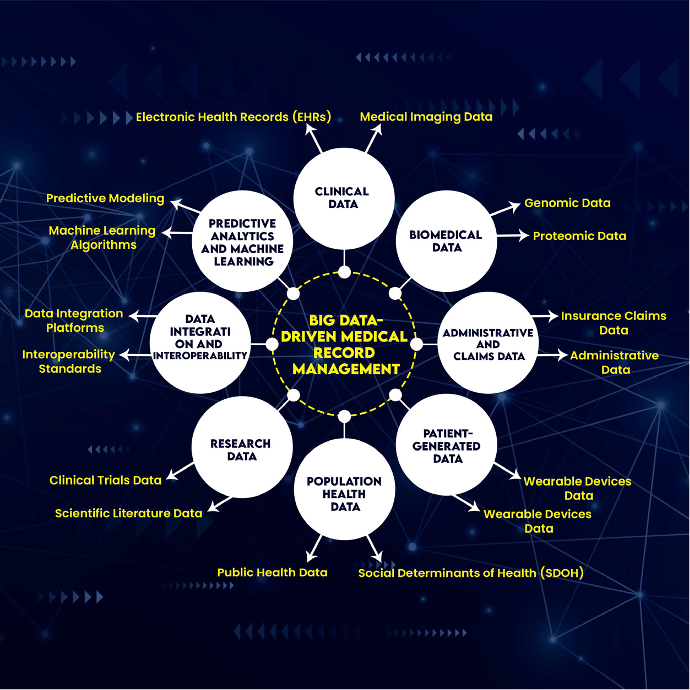The study summarizes the emerging paradigm of big data analytics in healthcare, covers its advantages, presents an organizational structure and method, lists instances from the industry, lightly examines its drawbacks, and draws inferences. The healthcare industry produced important information in the past due to records management, adherence to legal and regulatory obligations, and care delivery. Most data is kept in manuscript form, but there is a contemporary movement to digitize potentially immense quantities of information quickly. These enormous quantities of information can support a multitude of medical and universal healthcare operations, even amongst others, clinical decision-making, preventive medicine, and the management of population health, motivated by minimum standards and the chance to enhance public healthcare quality while lowering expenses.
Although profit is not and cannot be a major motivation, healthcare organizations must purchase the techniques, transport systems, and methodologies required to influence big data efficiently. Otherwise, they may risk missing out on hundreds of millions of dollars in prospective earnings and revenue. Big hospital complexes, care management organizations, separate practices, and other healthcare institutions will benefit significantly from the digitization, combination, and successful use of big data. Observational studies and investigations are conducted to find more affordable and clinically effective approaches to treating and diagnosing individuals. The ability to manage particular people and group healthcare, identify fraud in healthcare more quickly and successfully, and analyze a disease at an earlier phase so it can be cured more readily and successfully are all significant advantages. Big data analytics may be employed to respond to numerous inquiries.
Based on those mentioned above, we urge scholars to submit original research articles and review papers to the current Special Issue that will address the use of big data in efficiently managing medical records to expedite better treatment.
Potential topics include but are not limited to the following:
- Significance and possibility of big data analytics in healthcare.
- Computing and big data cooperation for a technologically public health system.
- Realizing its favorable circumstances and capacities for medical organizations.
- Detecting and managing high-risk as well as costlier individuals using analytics.
- Statement from the latest worldwide eHealth questionnaire on achieving universal healthcare.
- A crucial piece of medical advancements is the desktop client database.
- Disorder predictions utilize computer vision and huge quantities of information from the medical industry.
- Employing the possibilities of customer systems for decision support.
- A technological orientation to scalability systems for big business intelligence.
- Utilizing the web of things sensing and virtualized processing, health tracking, and administration.
- The intersection of synthetic and biological intellect is increased healthcare.
- Medical practitioners confront several obstacles before embracing electronic health information.
Guest Editors:
- Muhammad Farhan, COMSATS University Islamabad, farhanmuhammad.dr@gmail.com
- Khalid Mahmood, National Yunlin University of Science and Technology, khalid@yuntech.edu.tw
- Farhan Ullah, Northwestern Polytechnical University, farhan@nwpu.edu.cn
Key Dates:
- Deadline for Submission: 15 June, 2024
- First Reviews Due: 21 Aug, 2024
- Revised Manuscript Due: 25 Oct, 2024
- Final Decision: 23 Dec, 2024

